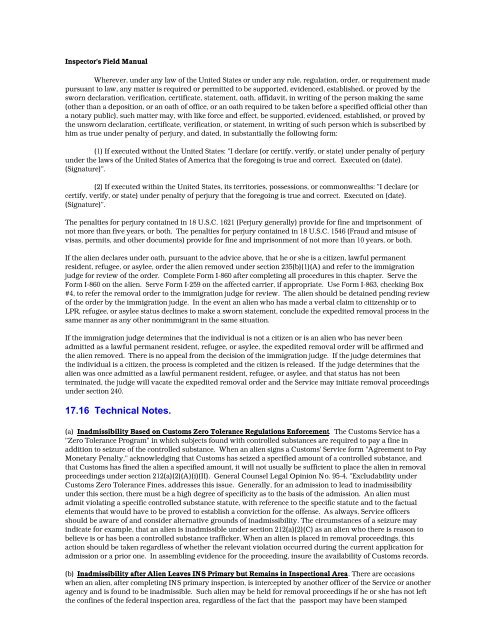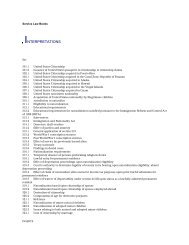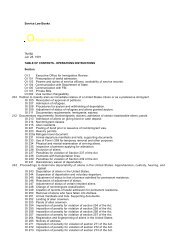Create successful ePaper yourself
Turn your PDF publications into a flip-book with our unique Google optimized e-Paper software.
<strong>Inspector's</strong> <strong>Field</strong> <strong>Manual</strong><br />
Wherever, under any law of the United States or under any rule, regulation, order, or requirement made<br />
pursuant to law, any matter is required or permitted to be supported, evidenced, established, or proved by the<br />
sworn declaration, verification, certificate, statement, oath, affidavit, in writing of the person making the same<br />
(other than a deposition, or an oath of office, or an oath required to be taken before a specified official other than<br />
a notary public), such matter may, with like force and effect, be supported, evidenced, established, or proved by<br />
the unsworn declaration, certificate, verification, or statement, in writing of such person which is subscribed by<br />
him as true under penalty of perjury, and dated, in substantially the following form:<br />
(1) If executed without the United States: "I declare (or certify, verify, or state) under penalty of perjury<br />
under the laws of the United States of America that the foregoing is true and correct. Executed on (date).<br />
(Signature)".<br />
(2) If executed within the United States, its territories, possessions, or commonwealths: "I declare (or<br />
certify, verify, or state) under penalty of perjury that the foregoing is true and correct. Executed on (date).<br />
(Signature)".<br />
The penalties for perjury contained in 18 U.S.C. 1621 (Perjury generally) provide for fine and imprisonment of<br />
not more than five years, or both. The penalties for perjury contained in 18 U.S.C. 1546 (Fraud and misuse of<br />
visas, permits, and other documents) provide for fine and imprisonment of not more than 10 years, or both.<br />
If the alien declares under oath, pursuant to the advice above, that he or she is a citizen, lawful permanent<br />
resident, refugee, or asylee, order the alien removed under section 235(b)(1)(A) and refer to the immigration<br />
judge for review of the order. Complete Form I-860 after completing all procedures in this chapter. Serve the<br />
Form I-860 on the alien. Serve Form I-259 on the affected carrier, if appropriate. Use Form I-863, checking Box<br />
#4, to refer the removal order to the immigration judge for review. The alien should be detained pending review<br />
of the order by the immigration judge. In the event an alien who has made a verbal claim to citizenship or to<br />
LPR, refugee, or asylee status declines to make a sworn statement, conclude the expedited removal process in the<br />
same manner as any other nonimmigrant in the same situation.<br />
If the immigration judge determines that the individual is not a citizen or is an alien who has never been<br />
admitted as a lawful permanent resident, refugee, or asylee, the expedited removal order will be affirmed and<br />
the alien removed. There is no appeal from the decision of the immigration judge. If the judge determines that<br />
the individual is a citizen, the process is completed and the citizen is released. If the judge determines that the<br />
alien was once admitted as a lawful permanent resident, refugee, or asylee, and that status has not been<br />
terminated, the judge will vacate the expedited removal order and the Service may initiate removal proceedings<br />
under section 240.<br />
17.16 Technical Notes.<br />
(a) Inadmissibility Based on Customs Zero Tolerance Regulations Enforcement. The Customs Service has a<br />
"Zero Tolerance Program" in which subjects found with controlled substances are required to pay a fine in<br />
addition to seizure of the controlled substance. When an alien signs a Customs' Service form "Agreement to Pay<br />
Monetary Penalty," acknowledging that Customs has seized a specified amount of a controlled substance, and<br />
that Customs has fined the alien a specified amount, it will not usually be sufficient to place the alien in removal<br />
proceedings under section 212(a)(2)(A)(i)(II). General Counsel Legal Opinion No. 95-4, "Excludability under<br />
Customs Zero Tolerance Fines, addresses this issue. Generally, for an admission to lead to inadmissibility<br />
under this section, there must be a high degree of specificity as to the basis of the admission. An alien must<br />
admit violating a specific controlled substance statute, with reference to the specific statute and to the factual<br />
elements that would have to be proved to establish a conviction for the offense. As always, Service officers<br />
should be aware of and consider alternative grounds of inadmissibility. The circumstances of a seizure may<br />
indicate for example, that an alien is inadmissible under section 212(a)(2)(C) as an alien who there is reason to<br />
believe is or has been a controlled substance trafficker. When an alien is placed in removal proceedings, this<br />
action should be taken regardless of whether the relevant violation occurred during the current application for<br />
admission or a prior one. In assembling evidence for the proceeding, insure the availability of Customs records.<br />
(b) Inadmissibility after Alien Leaves INS Primary but Remains in Inspectional Area. There are occasions<br />
when an alien, after completing INS primary inspection, is intercepted by another officer of the Service or another<br />
agency and is found to be inadmissible. Such alien may be held for removal proceedings if he or she has not left<br />
the confines of the federal inspection area, regardless of the fact that the passport may have been stamped




